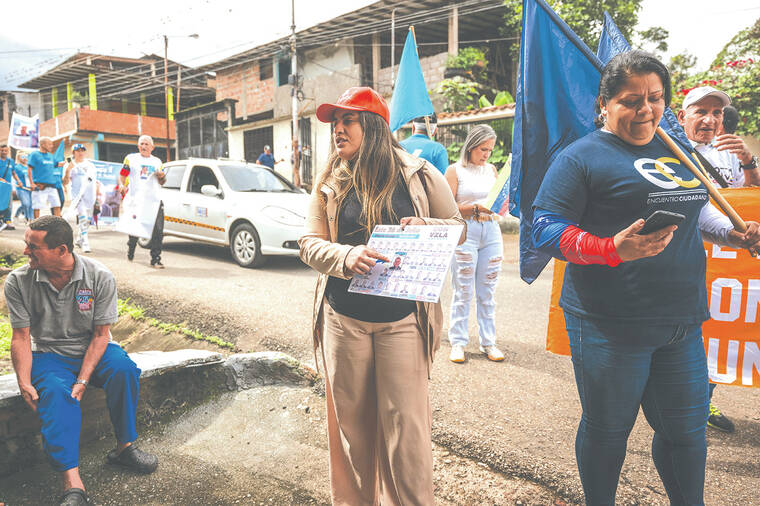Losing hope, Venezuelans vow to leave their country if Maduro wins
BOGOTÁ, Colombia — A young opposition activist planning to trek through seven countries and a perilous jungle to reach the United States. A journalist ready to abandon everything to build a new life abroad. A lawyer in her 60s, fearful that her last daughter is about to leave.
For thousands of Venezuelans, the decision to remain or flee their homeland depends on a single date: July 28. On that day, the country will vote in a high-stakes presidential election.
ADVERTISING
If the country’s authoritarian leader, Nicolás Maduro, declares victory, they say they will go. If the opposition candidate wins, they will stay.
“Everyone says the same thing,” said Leonela Colmenares, 28, the opposition activist. “If Maduro wins, they are leaving.”
Roughly a quarter of Venezuela’s population has already left, with almost 8 million people living in other countries, according to the United Nations, forming one of the largest migration crises in the world.
The exodus has torn apart families and stripped the country of its talent — and created an enormous challenge for President Joe Biden, who has had to contend with record levels of migration from Venezuela and other countries during his administration.
Overall, U.S. crossings are down in recent months over last year, amid efforts by the Biden administration to discourage people from seeking asylum at the southern border.
But August, September and October have traditionally been the most heavily traveled months through the Darién Gap, the dangerous jungle straddling Colombia and Panama that has become one of the world’s busiest routes for migrants moving north.
Not all Venezuelans will head to the United States, and not all who come to the United States will seek entry at the southern border. But any spike in migration would present another significant test for Biden just before the U.S. election.
Venezuelans arriving in the United States in recent years have filled shelters in New York and stretched budgets in cities like Denver. But the exodus has been felt just as deeply, if not more so, inside Venezuela, which has lost its teachers, doctors and engineers — and seen families scattered across the globe.
Some Venezuelans who have stayed behind did so because they thought they could promote change or serve their country from within. Now, after years of protests, an unyielding autocratic government and rounds of opposition leaders who have promised to push out Maduro — only to fail — many say they see this election as their last hope.
It’s not just a grinding economic crisis — spurred by government mismanagement and exacerbated by U.S. sanctions — that has lasted nearly a decade. In recent months, the government has also ramped up detentions of people it perceives as dissidents, leading to fears of further persecution if Maduro stays in power.
Nearly 300 political prisoners are in government custody, according to a watchdog group, Criminal Forum.
“I did everything I could for my country,” said Jesús Zambrano, 32, a journalist who is considering leaving for Germany. “But I’m not ready to go to prison for doing my job.”
One private poll by the company ORC Consultants, conducted in June, suggests that as many as one-third of Venezuelans are considering the possibility of migrating if the current government remains in power. Half of those said they would leave in the six-month period after the July 28 vote.
Some analysts are skeptical that the exodus would be that large or that sudden.
Nevertheless, migration is one issue that cuts across Venezuela’s socioeconomic and political lines, uniting a people severed by distance in a collective longing for reunification.
And it has become a key issue in this month’s election.
The country’s main opposition leader is María Corina Machado, an energetic former legislator whose central message is a promise to bring Venezuelans home by restoring democracy and getting the economy back on track.
“This fight is so that you return!” Machado shouted at a rally in the eastern city of Maturín, where a woman in the crowd had held up a cellphone connected to her daughter in a far-off country.
Banned by Maduro’s government from running in the election, Machado is not actually on the ballot. Instead, her coalition has put a surrogate on the ticket, a former diplomat named Edmundo González.
Machado has gone on the campaign trail for González and has sought to cultivate a nearly religious presence. She often appears dressed in white, a cross swinging from her neck, embracing supporters who shout “María! María!” everywhere she goes.
The González-Machado campaign has promoted videos of Venezuelans overcome with emotion, desperate for them to win and bring their families back.
“They’ve all gone! All of my relatives!” shouted one young woman at a camera at a recent opposition event, her voice cracking in pain.
“Where is your family?” the camera operator asked.
“In the United States,” she gulped. “Peru. Ecuador. Colombia. I’m so tired of it.”
In recent years, photos of weary Venezuelans hiking through the treacherous Darién jungle and up to the U.S. border have made the troubles inside the country all the more real for the rest of the world.
Maduro has long blamed the country’s mass migration on U.S. sanctions, the most severe of which were placed on the oil industry in 2019.
Facing a serious electoral challenge, he has started mentioning the diaspora more often — and not simply accusing the United States of causing the mass flight. He is also appealing to citizens to come home.
On his television show last month, he claimed that a new program, called the Grand Mission Return to the Homeland, would offer returnees “comprehensive socioeconomic protection that only the humanist, Christian Bolivarian revolution of Venezuela can give.” (The “Bolivarian revolution” is his socialist movement.) But he did not offer concrete details.
“Venezuela is back in style!” he asserted.
© 2024 The New York Times Company





